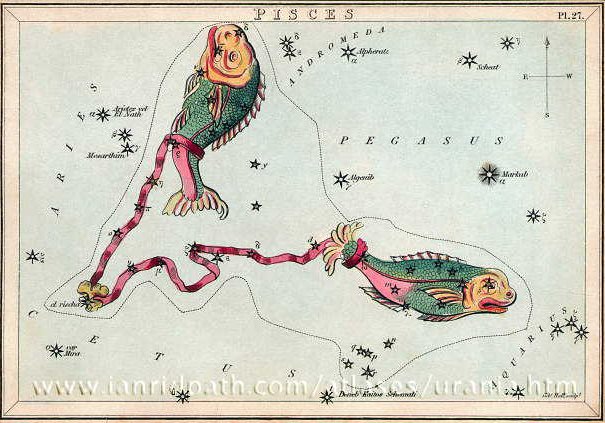2. The bellies of the fishes in Pisces are worthy of notice:
The colour of these bellies is a rosy red (the colour of dawn) and the tails are yellow. In the rising fish the belly is turned to summer but in the early fish it is not yet so. The band around the rising fish is where a constriction probably will result in the release of roe. We can sometimes expect that word similarities once were used for word play, and such can generate redundance, in this case by alluding to the offspring of the roe (close cousing to the Stag):
The idea of the belly of a whale as the location for Sun during the night was widespread in ancient times. Some sort of creature must swallow Sun at the horizon in the west and later release him at the horizon in the east. A faint echo may even be detected in what happened when Odysseus returned home from his long absence: "12. Odysseu's arrival home: Transformed by Athene into the semblance of a beggar (Noman, still), the returned master of the house was recognized only by his dog and his old, old nurse. The latter spied above his knee the old scar of a gash received from the tusk of a boar. (Compare Adonis and the boar, Attis and the boar, and, in Ireland, Diarmuid and the boar.) Hushing the nurse, Odysseus watched for some time the shameless behavior of the suitors and maidservants in his house; whereafter, and at last: 13. Penelope, offering to marry any one of those present who could draw the powerful bow of her spouse, set up a target of twelve axes to be pierced. None of the suitors could even string the bow. Several tried manfully. The recently come beggar then offered and was mocked. However, as we read: He already was handling the bow, turning it every way about, and proving it on this side and that, lest the worms might have eaten the horns when the lord of the bow was away ... And Odysseus of many counsels had lifted the great bow and viewed it on every side, and even as when a man that is skilled in the lyre and in minstralsy, easily stretches a cordabout a new peg, after tying at either end the twisted sheep-gut, even so Odysseus straightway bent the great bow, all without effort, and took it in his right hand and proved the bowstring, which rang sweetly at the touch, in tone like a swallow. Then great grief came upon the wooers, and the color of their countenance was changed, and Zeus thundered loud showing forth his tokens. And the steadfast goodly Odysseus was glad thereat, in that the son of deep-counselling Cronus had sent him a sign. Then he caught up a swift arrow which lay by his table, bare, but the other shafts were stored within the hollow quiver, those whereof the Achaeans were soon to taste. He took and laid it on the bridge of the bow, and held the notch and drew the string, even from the settle whereupon he sat, and with straight aim shot the shaft and missed not one of the axes, beginning from the first ax-handle, and the bronze-weighted shaft passed clean through and out at the last. The solar hero having thus demonstrated his passage of the twelve signs and his lordship of the palace, he proceeded masterfully to the shooting down of the suitors. 'And they writhed with their feet for a little space, but for no long while.' After which, 'Thy bed verily shall be ready,' said the wisely wifely Penelope. 'Come tell me of thine ordeal. For methinks the day will come when I must learn it, and timely knowledge is no hurt'." (Joseph Campbell The Masks of God: Occidental Mythology.) Timely knowledge is no hurt, and sometimes you can even benefit from knowing time. The passage went easily through the 12 signs, straight as an arrow. The sign of the swallow comes just before Odysseus emerges as his real self, revealing himself to be a man (no longer a no-man beggar): ... Odysseus straightway bent the great bow, all without effort, and took it in his right hand and proved the bowstring, which rang sweetly at the touch, in tone like a swallow ... |

